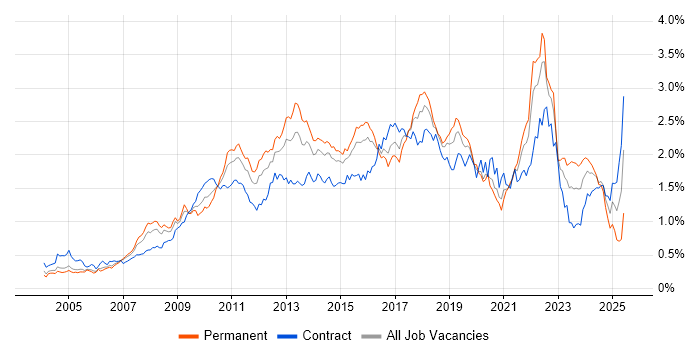Unit Testing
Central London > City of London
The table below provides summary statistics and salary benchmarking for jobs advertised in the City of London requiring Unit Testing skills. It covers permanent job vacancies from the 6 months leading up to 30 December 2025, with comparisons to the same periods in the previous two years.
| 6 months to 30 Dec 2025 |
Same period 2024 | Same period 2023 | |
|---|---|---|---|
| Rank | 116 | 134 | 130 |
| Rank change year-on-year | +18 | -4 | -40 |
| Permanent jobs citing Unit Testing | 10 | 35 | 40 |
| As % of all permanent jobs in the City of London | 0.48% | 1.29% | 1.41% |
| As % of the Processes & Methodologies category | 0.54% | 1.35% | 1.48% |
| Number of salaries quoted | 7 | 21 | 27 |
| 10th Percentile | £80,500 | - | £42,200 |
| 25th Percentile | £97,500 | £52,500 | £52,500 |
| Median annual salary (50th Percentile) | £125,000 | £82,500 | £65,000 |
| Median % change year-on-year | +51.52% | +26.92% | -36.59% |
| 75th Percentile | - | £112,500 | £93,750 |
| 90th Percentile | £143,000 | £150,000 | £101,000 |
| Central London median annual salary | £125,000 | £81,250 | £65,000 |
| % change year-on-year | +53.85% | +25.00% | -36.59% |
All Process & Methodology Skills
City of London
Unit Testing falls under the Processes and Methodologies category. For comparison with the information above, the following table provides summary statistics for all permanent job vacancies requiring process or methodology skills in the City of London.
| Permanent vacancies with a requirement for process or methodology skills | 1,837 | 2,590 | 2,707 |
| As % of all permanent jobs advertised in the City of London | 87.64% | 95.47% | 95.12% |
| Number of salaries quoted | 1,364 | 1,691 | 2,434 |
| 10th Percentile | £42,500 | £46,250 | £40,750 |
| 25th Percentile | £57,500 | £55,000 | £55,000 |
| Median annual salary (50th Percentile) | £77,500 | £75,000 | £75,000 |
| Median % change year-on-year | +3.33% | - | - |
| 75th Percentile | £100,000 | £95,000 | £96,250 |
| 90th Percentile | £115,000 | £117,500 | £115,000 |
| Central London median annual salary | £77,500 | £75,000 | £75,000 |
| % change year-on-year | +3.33% | - | - |
Unit Testing
Job Vacancy Trend in the City of London
Historical trend showing the proportion of permanent IT job postings citing Unit Testing relative to all permanent IT jobs advertised in the City of London.

Unit Testing
Salary Trend in the City of London
Salary distribution trend for jobs in the City of London citing Unit Testing.

Unit Testing
Salary Histogram in the City of London
Salary distribution for jobs citing Unit Testing in the City of London over the 6 months to 30 December 2025.
Unit Testing
Co-Occurring Skills & Capabilities in the City of London by Category
The following tables expand on the one above by listing co-occurrences grouped by category. They cover the same employment type, locality and period, with up to 20 co-occurrences shown in each category:
|
|
|||||||||||||||||||||||||||||||||||||||||||||||||||||||||||||||||||||||||||
|
|
|||||||||||||||||||||||||||||||||||||||||||||||||||||||||||||||||||||||||||
|
|
|||||||||||||||||||||||||||||||||||||||||||||||||||||||||||||||||||||||||||
|
|
|||||||||||||||||||||||||||||||||||||||||||||||||||||||||||||||||||||||||||
|
|
|||||||||||||||||||||||||||||||||||||||||||||||||||||||||||||||||||||||||||
|
|
|||||||||||||||||||||||||||||||||||||||||||||||||||||||||||||||||||||||||||
|
|
|||||||||||||||||||||||||||||||||||||||||||||||||||||||||||||||||||||||||||
|
||||||||||||||||||||||||||||||||||||||||||||||||||||||||||||||||||||||||||||
